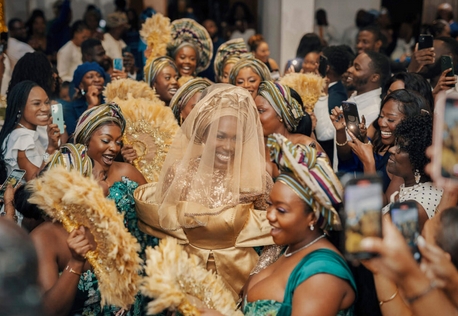
support@yorubalibrary.com
+2348073529208, 07038599574

Marriage is a significant cultural institution among the Yoruba people of Nigeria. Yoruba marriage customs are rich in tradition and reflect the community's values, beliefs, and social structures. This article explores the intricate customs and rituals that occur before and after a Yoruba wedding.
Pre-Wedding Customs
Introduction Ceremony (Mọ̀nmin-n-mon O)
The introduction ceremony, is the first step in Yoruba marriage customs. During this event, the families of the bride and groom formally meet to discuss the potential union and express their approval.
• Family Introduction: The groom’s family visits the bride’s family, bringing gifts and introducing themselves. This visit is an opportunity for both families to get acquainted and build rapport.
• Proposal Acceptance: The groom’s family formally presents their intention to marry the bride, and the bride’s family accepts or declines the proposal. If accepted, both families discuss the next steps and plan the engagement ceremony.
Engagement Ceremony (Ìdána)
The engagement ceremony, or Ìdána, is a vibrant and joyous occasion, filled with traditional rites and celebrations.
• Presentation of Dowry (Owo Ori): The groom's family presents the bride's family with a dowry, which typically includes money, clothing, food items, and other gifts. This is a symbolic gesture of the groom's ability to take care of his bride.
• Reading of the Letter: The groom’s family presents a letter of intent, which is read aloud by a designated family member. The letter formally requests the bride’s hand in marriage.
• Prayers and Blessings: Elders from both families offer prayers and blessings for the couple's future. This is followed by traditional songs, dances, and the sharing of kola nuts and alligator pepper.
The Wedding Day
The wedding day is the pinnacle of Yoruba marriage customs, combining both traditional and, in many cases, modern elements.
Traditional Wedding Ceremony
• Traditional Attire: The bride and groom wear elaborate traditional attire, often made from Aso-Oke or other indigenous fabrics. The bride's outfit typically includes a Gele (head tie), Buba (blouse), and Iro (wrapper), while the groom wears an Agbada (flowing robe) and Fila (cap).
• Wedding Rites: The wedding ceremony includes various rites, such as the exchange of vows, the joining of hands, and the offering of gifts to the couple by family members and guests.
• Traditional Music and Dance: The ceremony is accompanied by traditional music and dance, which are integral parts of Yoruba celebrations. Drummers, singers, and dancers entertain guests and create a festive atmosphere.
Church or Registry Wedding
Many Yoruba couples also have a church or registry wedding, blending traditional customs with modern practices. This part of the celebration often includes:
• Religious Blessings: A religious leader or official conducts the ceremony, offering prayers and blessings for the couple.
• Exchange of Rings: The couple exchanges rings as symbols of their commitment and love.
• Reception: A reception follows, featuring speeches, cutting of the wedding cake, and further celebrations with family and friends.
Post-Wedding Customs
Return of the Bride
The return of the bride, is a post-wedding custom where the bride visits her family a few days after the wedding.
• Gifts and Celebrations: The bride returns to her family with gifts from her new husband. This visit is celebrated with a small gathering, marking the bride's transition into her new life.
• Advice and Blessings: The bride’s family offers her advice and blessings, reinforcing their support and love for her.
Settling into Married Life
• Integration: The couple begins their life together, often with the support and guidance of both families. They are expected to uphold family values and contribute to the community.
• Continued Celebrations: Yoruba marriages are celebrated over time with various gatherings and ceremonies, reflecting the ongoing importance of family and community in the couple's life.
Conclusion
Yoruba marriage customs are a testament to the community’s rich cultural heritage. From the introduction ceremony to post-wedding rituals, these customs highlight the importance of family, tradition, and social bonds in Yoruba society. The blend of traditional and modern elements in Yoruba weddings showcases the dynamic and evolving nature of Yoruba culture.

Learn about the Yoruba concept of Ìwà Pẹ̀lẹ́ (good…

Learn special praises for Divine Being and Creator…